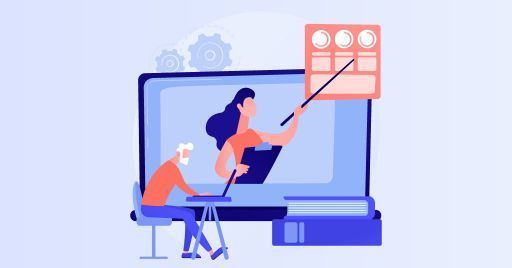
How to make online continuing education accessible

Continuing education is no longer a visionary project of large companies, but an urgent necessity also for small and medium enterprises. How to keep life learning alive with a small budget and quickly? (The answer is in eLearning).
In addition to the many good reasons to put continuous training into practice, there is another one: causes of force majeure. In this case, it is a health emergency, but it can be any unforeseeable event that urgently requires updating the skills of public and private employees, managers and new recruits. Exactly what does continuous training mean and how can it be put into practice for companies with a reduced budget?
What does continuous training mean?
Lifelong learning, as it is called continuing education in English, is a lifelong learning process that is aimed at any person who wants or needs to learn new skills and expand their knowledge after compulsory schooling.
The continuing education for adults, on a voluntary basis, is accompanied by targeted and sometimes legally required courses such as continuing education for surveyors, industrial experts, teachers, journalists and any other professional category. In addition to the skills specific to your sector, you can learn transversal or soft skills, which can be applied in every area of work: from problem solving to customer care.
Why is continuous training important?
One of the most immediate answers that explain the importance of continuing education is that it is the key to the personal and professional development of each individual. By acquiring new skills, you not only do your job better, but you can find better opportunities.
We have learned from the experience of the last few months that continuing education is also a requirement for dealing with emergency situations in the best possible way. By preparing yourself day after day, by expanding your skills, you can ensure that you do not arrive unprepared when needed.
It is enough to think of the impact that the continuous training of teachers in the digital environment and the continuous training of health personnel on distance learning or health emergency management respectively would have had, to understand that training is not only personal, but also collective.
The same can be said for the transmission of knowledge within a company: a continuous flow of training from new to old generations has an impact not only on the development of the individual but also on the general well-being of the company.
Why continuous distance learning?
According to the Global Human Capital Trend of 2016, training plays a very important role for 86% of Italian companies. The biggest challenge for companies around the world is how to keep knowledge within the company and update staff in the shortest possible time and in the most effective way. For employees, the same study shows, it is important to access training content that can be chosen independently, at any time.
The answer to the needs of companies and employees is continuous training. To ensure that it is always accessible, even in an emergency, that leads to personal and collective development at the same time, respecting a budget or restricted funding lines, the answer is eLearning. Accessibility of courses at any time and in any place, use of playful methodologies that promote learning, customization of training paths, savings on management costs compared to courses in presence are just some of the advantages of training in eLearning.
In recent times we have had tangible confirmation of the central role that continuous training plays in promoting the individual but also the well-being of companies and society in general. To ensure that everyone has access to training and that they can prepare day after day for the technological, economic, health or social challenges of the new millennium, the most effective and immediate response is certainly eLearning.
Translated with www.DeepL.com/Translator
Did you like this article? Sign up for the newsletter and receive weekly news!
Subscribe to NewsletterComments:
No comments are in yet. You be the first to comment on this article!